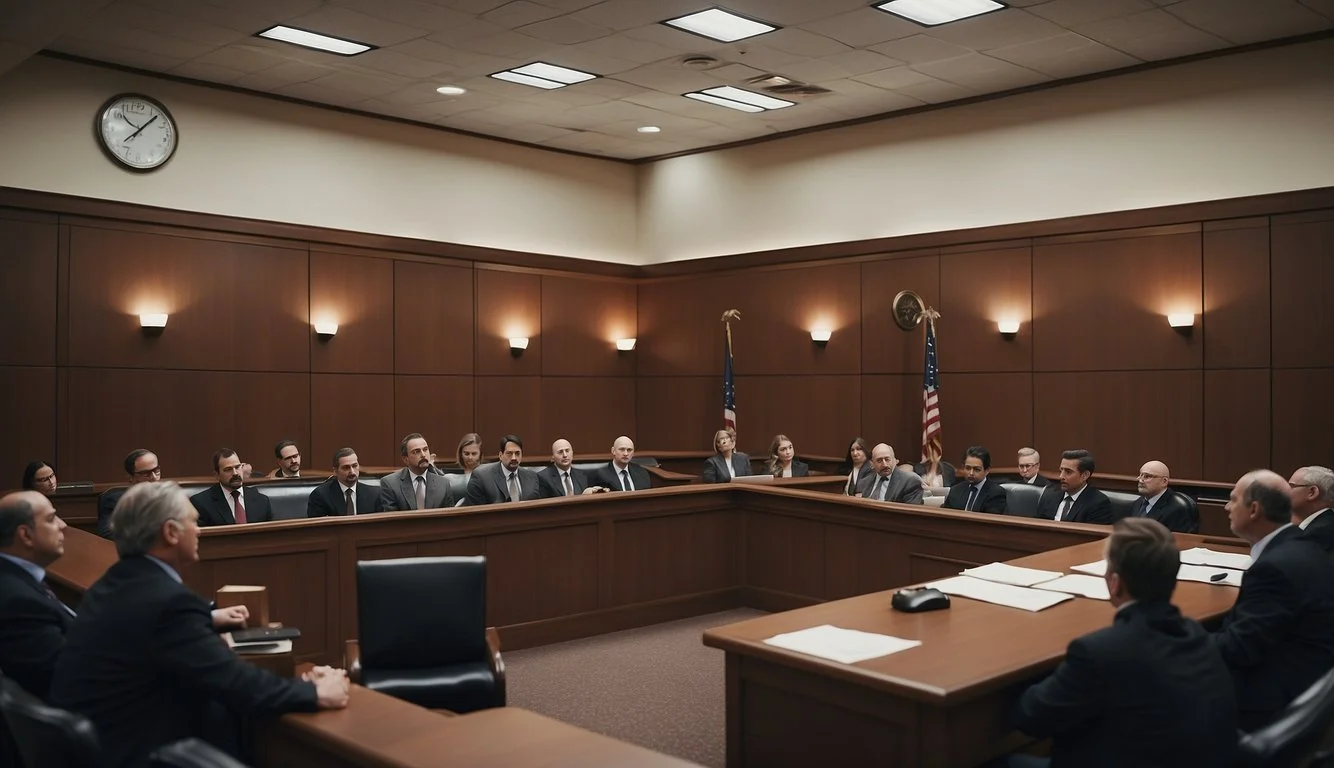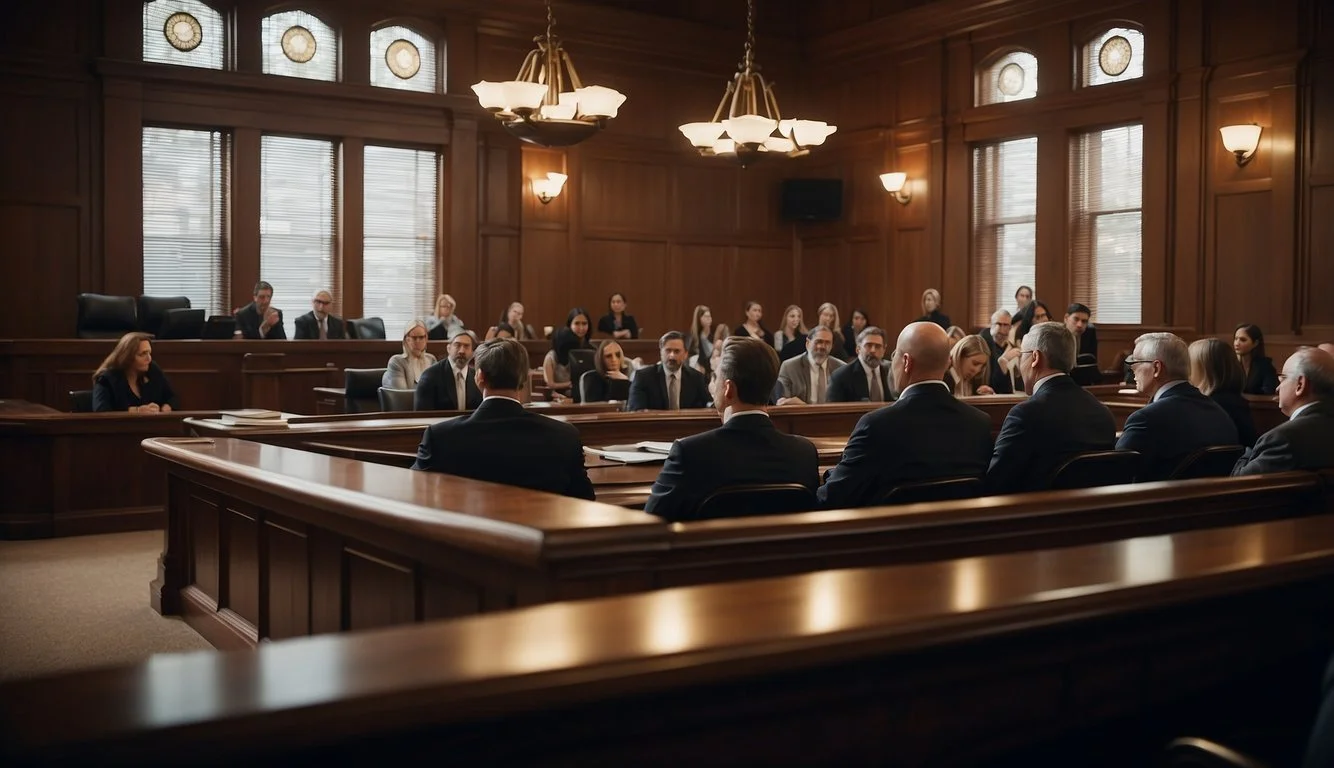Documentary Review: Till Murder Do Us Part
Soering vs. Haysom (2023) - A Riveting Analysis
The true-crime genre finds a gripping new entry with Netflix's "Till Murder Do Us Part: Soering vs. Haysom," a four-part docu-series that revisits a shocking 1985 case. The story revolves around Jens Soering and Elizabeth Haysom, two university students who became prime suspects in the brutal murders of Haysom's parents, Derek and Nancy Haysom. Their subsequent convictions and the lingering questions about the case provide fertile ground for compelling narrative and analysis.
The series delves deep into the investigation, trial, and the decades-long aftermath, offering fresh insights and raising questions about Soering's involvement. Through interviews and new evidence, the documentary aims to shed light on whether justice was truly served or if there were miscarriages in the legal process.
Viewers are taken on a nuanced journey that explores not just the crime itself, but the psychological and emotional factors at play. With its detailed recounting of events and probing questions, "Till Murder Do Us Part: Soering vs. Haysom" promises to captivate anyone with an interest in true crime and the complexities of the legal system.
Overview of 'Till Murder Do Us Part: Soering vs. Haysom'
The documentary "'Till Murder Do Us Part: Soering vs. Haysom'" explores the controversial conviction of Jens Soering and Elizabeth Haysom for the murder of her parents. It delves into the various aspects of the case, including the court proceedings, evidence, and the enduring questions surrounding their guilt.
Synopsis
"'Till Murder Do Us Part: Soering vs. Haysom'" centers on the 1985 murders of Derek and Nancy Haysom. Jens Soering, the boyfriend of their daughter Elizabeth Haysom, was accused and convicted of their brutal slayings. The series provides a detailed recounting of their arrest, trial, and subsequent imprisonment.
The documentary revisits the crime scenes and includes interviews with key figures involved in the case. It sheds light on the complexities and media frenzy of the trial, exploring whether justice was truly served.
Director and Production
This Netflix docu-series is directed by a team of seasoned filmmakers known for their work in the true-crime genre. Their approach combines archival footage, contemporary interviews, and dramatic re-enactments to create a compelling narrative.
The production values are high, with meticulous attention to detail regarding the events of 1985 and beyond. The series is structured across four parts, with each episode focusing on different elements of the case. This method ensures a comprehensive yet engaging examination of the events.
Context of the Soering-Haysom Case
In 1985, the murder of Derek and Nancy Haysom shocked the affluent community where they lived. Their daughter, Elizabeth, and her boyfriend, Jens Soering, were both University students who initially fled to Europe, heightening media interest and suspicion.
Jens Soering, the son of a German diplomat, initially confessed but later claimed his confession was coerced. Elizabeth Haysom also provided incriminating statements, though both have since given conflicting accounts over the years. This case raises significant questions about the criminal justice system and the reliability of evidence used in their conviction.
The documentary addresses these issues, presenting new insights and perspectives. This adds to the viewer's understanding of why this case continues to captivate and provoke debate decades later.
Historical Background
The documentary "Till Murder Do Us Part: Soering vs. Haysom" examines the complex and tragic events surrounding the 1985 murders of Derek and Nancy Haysom. The involvement and subsequent conviction of their daughter Elizabeth Haysom and her boyfriend Jens Soering paint a chilling picture of betrayal and violence.
Timeline of Events
1985: On March 30, Derek and Nancy Haysom were brutally murdered in their home in Bedford County, Virginia. Their bodies were discovered with multiple stab wounds.
1986: Elizabeth Haysom and Jens Soering were arrested in London, suspected of involvement in the murders. They were eventually extradited to the United States.
1990: Jens Soering was convicted of first-degree murder and sentenced to life imprisonment. Elizabeth Haysom pleaded guilty to being an accessory before the fact to murder and received a 90-year sentence.
Aftermath: Over the years, various claims of innocence and requests for retrials have been made, with new evidence occasionally brought to light.
Profiles of Jens Soering and Elizabeth Haysom
Elizabeth Haysom: Hailing from a wealthy family, Elizabeth was an intelligent and articulate young woman. Her parents, Derek and Nancy, were respected members of their community. Elizabeth's tumultuous relationship with her parents and her romantic involvement with Soering were pivotal in the tragic events of 1985.
Jens Soering: A German national and the son of a diplomat, Jens was a promising student studying at the University of Virginia, where he met Elizabeth. Despite a privileged background, his life took a drastic turn when he became implicated in the Haysom murders. Soering has persistently claimed his innocence, and his conviction remains a subject of debate and scrutiny.
Documentary Structure
The documentary "Till Murder Do Us Part: Soering vs. Haysom" employs strategic techniques in narrative storytelling, cinematography, and sound design to explore a controversial murder case.
Narrative Technique
"Till Murder Do Us Part: Soering vs. Haysom" uses a combination of interviews, archival footage, and dramatic reenactments. These elements provide a comprehensive perspective on the 1985 murder case.
Key figures like Jens Soering and Elizabeth Haysom are extensively interviewed. Their testimonies add depth to the timeline of events. Archival footage, including courtroom scenes and media coverage from the period, bolsters authenticity.
The series also uses text overlays and graphics to highlight critical points and evidence. This keeps the viewer engaged and informed throughout the episodes. The episodic structure allows the narrative to unfold progressively.
Cinematography
The cinematography in the documentary emphasizes a somber and reflective tone. The use of subdued lighting and rich, shadowy visuals mirrors the dark themes of the series. Location shots of significant places, like the crime scene and courtroom, are meticulously framed.
Close-up shots are frequently used during interviews. This technique builds an intimate connection between the audience and the interviewees. The documentary leverages drone footage and panoramic shots to establish the setting and context.
Reenactments are filmed with a dramatic, cinematic flair. These segments employ techniques such as slow-motion to highlight key moments, ensuring they are both visually and emotionally impactful.
Music and Sound Design
The music in "Till Murder Do Us Part: Soering vs. Haysom" is carefully curated to complement the narrative. A haunting and minimalistic musical score underscores the gravity of the events discussed. This score uses string instruments and ambient sounds to create an eerie, suspenseful atmosphere.
Sound design plays a crucial role in reinforcing the documentary's mood. Subtle background noises, like the rustling of leaves or hushed courtroom murmurs, add an extra layer of immersion. Sound effects during reenactments, such as footsteps or door creaks, are employed to heighten tension.
The balance between dialogue and background sound is meticulously maintained. This ensures clarity, making the documentary accessible and engaging for viewers.
Critical Analysis
The docu-series "Till Murder Do Us Part: Soering vs. Haysom" offers a deep dive into a notorious 1985 murder case involving university students Jens Soering and Elizabeth Haysom. This section evaluates its objectivity and bias, the emotional impact it delivers, and its use of archival footage.
Objectivity and Bias
The series takes on a complex task of presenting a balanced view of the case. While it includes testimonies from both sides and interviews with legal experts and journalists, it's crucial to identify if it leans towards a particular narrative.
Questions about the fairness of the trial and the portrayal of the accused may arise, making viewers scrutinize the documentary's representation.
Emotional Impact
The emotional gravity of the Haysom murder case is potentiated by personal interviews and graphic details. Interviews with family members, friends, and law enforcement speak to the devastating effects on those involved.
The series does not shy away from showing the human cost of the crime, which is pivotal in engaging the audience at a psychological level. This makes the viewer feel the weight of the murders beyond just the facts and figures.
Use of Archival Footage
Archival footage plays a significant role in the series’ storytelling. The integration of old news reports, courtroom footage, and personal photos brings a layer of authenticity.
The archival material aids in reconstructing the timeline of events and provides tangible evidence that enhances understanding. This use of real footage helps ground the narrative in reality, keeping the audience connected to the historical context while underscoring the gravity of the case.
Interviews and Testimonials
The documentary "Till Murder Do Us Part: Soering vs. Haysom" delves into the complex layers of the infamous 1985 murder case. Central to its narrative are interviews and testimonials from key witnesses, experts, journalists, and family members, providing a comprehensive view of the crime and its aftermath.
Key Witnesses
Key witnesses play a pivotal role in constructing the narrative of the documentary. Testimonies from law enforcement officials and detectives involved in the case offer crucial insights into the investigation process.
Their accounts highlight the challenges faced during the initial stages of the investigation and provide firsthand details on how evidence was gathered. These insights are invaluable in understanding the sequence of events leading up to the arrests of Elizabeth Haysom and Jens Soering.
Experts and Journalists
Experts and journalists contribute a layered perspective to the documentary, analyzing the case from multiple angles. Forensic specialists break down the physical evidence, laying out the technical details that were pivotal in the trial.
Journalists who covered the case offer their narratives, underlining how media coverage influenced public perception. Their retrospectives help viewers grasp the broader societal impact of the case and underscore the significance of nuanced, unbiased reporting in criminal cases.
Family Members
Family members' interviews add an emotional depth to the documentary, exposing the human cost of the crime. Conversations with relatives of Derek and Nancy Haysom reveal the devastating impact their murders had on their extended family.
Statements from Elizabeth Haysom's relatives provide a humanizing look at her life before and after the crime, offering viewers a fuller picture of the person behind the headlines. These personal stories underscore the far-reaching consequences of the tragedy for all involved.
Legal and Ethical Considerations
Legal and ethical issues surrounding the documentary Till Murder Do Us Part: Soering vs. Haysom focus mainly on the presentation of evidence and its implications for the true crime genre. These elements are crucial for understanding the documentary's impact and responsibilities.
Presentation of Evidence
The documentary tackles the 1985 murders of Derek and Nancy Haysom. Jens Soering, the boyfriend of their daughter Elizabeth, was convicted for the crimes.
Key pieces of evidence include interviews, court documents, and personal testimonies. The filmmakers' decisions about which evidence to highlight significantly influence public perception.
Accuracy is paramount. Misrepresenting facts can lead to misinformation and unfair judgments. Ethical concerns arise when dramatizations blur the line between fact and fiction. Many viewers may not distinguish between actual occurrences and artistic representations, impacting Jens Soering's case and how audiences understand the legal process.
Implications for True Crime Genre
True crime documentaries like Till Murder Do Us Part have a distinct role in media. They present real-life cases and, as such, hold immense responsibility. Ethical storytelling is essential to avoid sensationalism, which can exploit victims and their families for entertainment.
Another key issue is the potential for re-traumatizing individuals connected to the case. Producers must balance the need to engage audiences with the imperative to maintain sensitivity and respect towards the affected parties.
The series' approach to Jens Soering's conviction highlights broader legal and societal implications. The content can influence future criminal justice policies and public opinion.
Utilizing accurate information and ethical narratives ensures that the true crime genre remains a valuable, responsible medium for storytelling.
Public Reception and Impact
The release of Till Murder Do Us Part: Soering vs. Haysom has sparked notable reactions among viewers and the media, influencing both public opinion and legal discourse. The series delves into a complex legal case, shedding light on both the suspects and the investigation.
Viewership Response
The docu-series attracted a significant audience, drawing in true-crime enthusiasts and those familiar with the case. Many viewers were engrossed by the intricate details and the emotional narratives of the key figures involved. Social media platforms buzzed with discussions and debates, with hashtags related to the series trending for days. The series also prompted viewers to revisit the case, leading to increased online searches and discussions about the legal proceedings and the positions of the accused.
Critics' Reviews
Critics generally offered positive feedback, highlighting the meticulous research and compelling storytelling. Reviews noted the series' ability to present a balanced view of the events, focusing on both the prosecution's and defense's perspectives. The blend of archival footage and contemporary interviews provided a well-rounded narrative. While some reviews pointed out minor pacing issues, the overall consensus praised the series as a captivating and thought-provoking addition to the true-crime genre. Notable critics from well-known publications endorsed the series, further increasing its visibility.
Influence on Legal Proceedings
The series had a noticeable impact on public awareness of the legal intricacies surrounding the case. By presenting detailed accounts of the trial and subsequent appeals, it prompted renewed interest in the judicial process. Some advocacy groups used the series to lobby for a re-examination of the case, arguing for potential legal reforms. Legal experts appeared in media discussions, dissecting the series and the case, which in turn influenced public perception and added pressure on legal institutions to address lingering questions. The documentary's reach extended beyond entertainment, affecting real-world legal discussions and policies.
Conclusion
Till Murder Do Us Part: Soering vs. Haysom provides a thought-provoking narrative of the 1985 murders of Derek and Nancy Haysom. Through interviews, court testimonies, and archival footage, the docu-series manages to paint a vivid picture.
Jens Soering and Elizabeth Haysom, central figures in the case, are portrayed with depth. Their conflicting stories and the complexities surrounding their relationship remain a focal point.
The series captures the audience's attention with its examination of the judicial process and the pursuit of truth. Despite the evidence presented, questions about the guilt and innocence of the parties involved continue to linger.
The format of the series, broken into four parts, ensures that viewers remain engaged. Each episode reveals new layers of the case, maintaining a balance between factual representation and narrative storytelling.
The production quality stands out, with well-researched content and compelling visuals that complement the intense subject matter. The interviews, especially, offer valuable insights into the minds of those involved.
For true crime enthusiasts, Till Murder Do Us Part: Soering vs. Haysom offers a gripping exploration of a convoluted case. It invites viewers to question and scrutinize the justice system while drawing their conclusions.
The series manages to stay neutral, presenting facts without overtly swaying the audience to one side.








